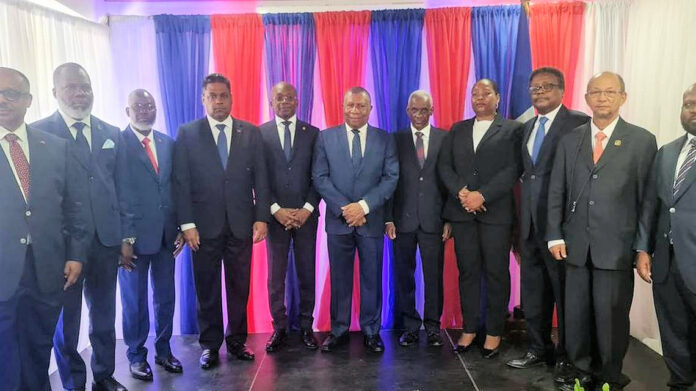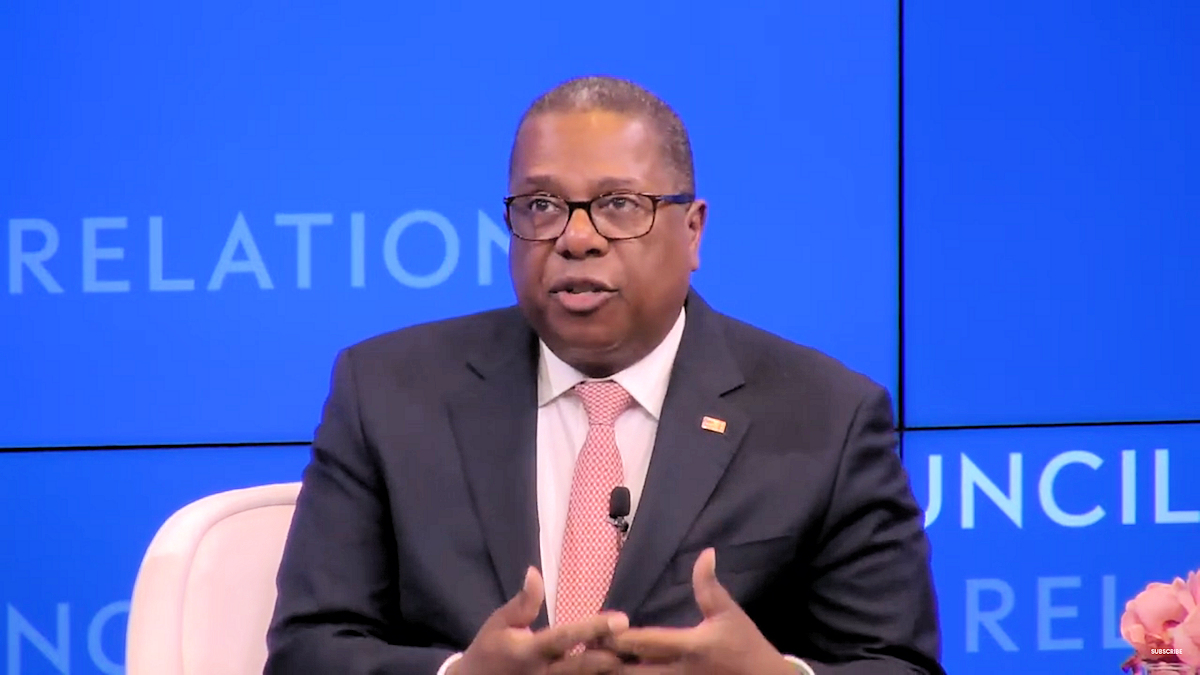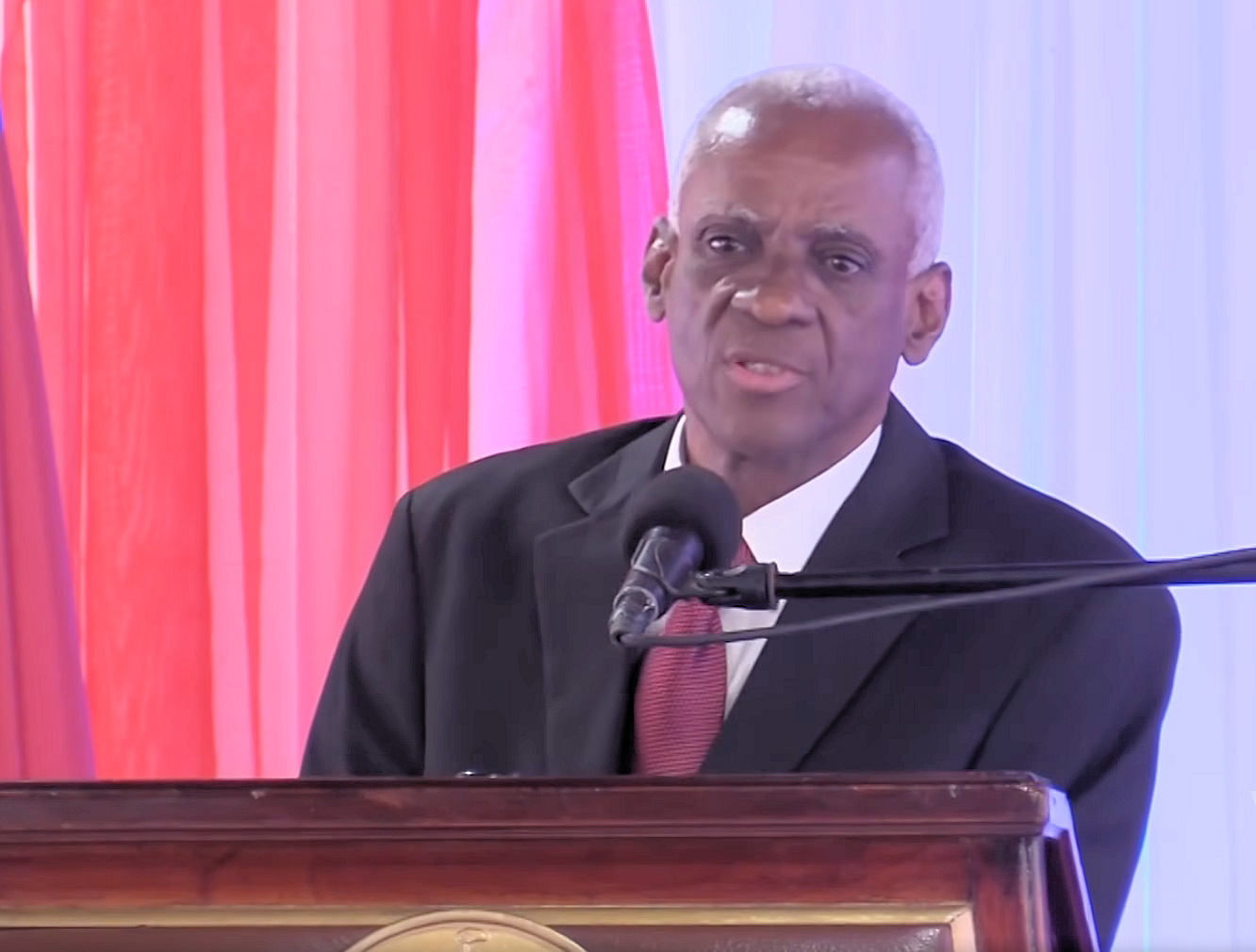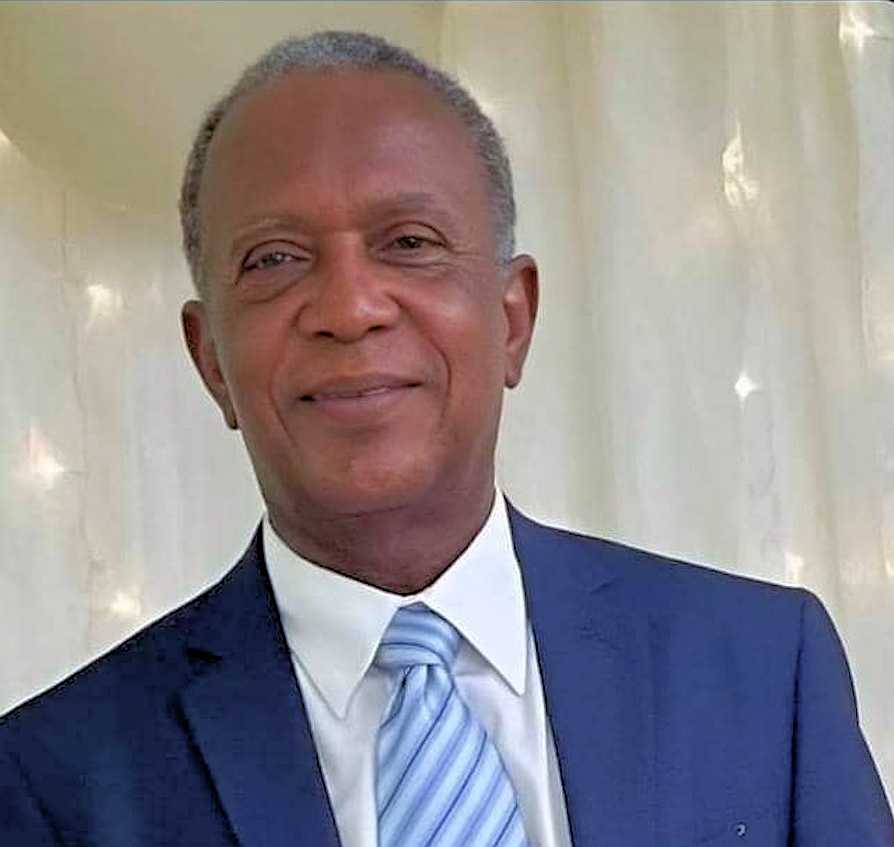
(The third of three parts)
In Part Two of this series, Ross shows how Washington has organized several programs to fund and influence Haitian civil society organizations (CSOs) through the Civil Society Strengthening Program and potentially fill the Government Action Control Body – a consultative body to the Presidential Council – with compliant CSO leaders who are in sync with U.S. policy goals in Haiti. In addition, USAID’s “Haiti Electoral Security and Support Program” threatens to allow Washington to, once again, skew the results of Haiti’s elections.
After calling an emergency meeting in Kingston, Jamaica on Mar. 11 to concoct a way to fill the void left by former Prime Minister Ariel Henry’s unexpected ouster, Washington finally swore in its nine-member “Temporary Presidential Council” (TPC) on Apr. 25, although the ceremony had to be done secretly at the National Palace due to the body’s unpopularity.
The TPC would be installed at the Villa d’Accueil, caretaker authorities had said earlier last week, claiming that a delegation of Leslie Voltaire, Himmler Rébu, and Raymond Jeanty deemed the area around the Palace too dangerous. Since Feb. 29, it has been the target of many attacks from soldiers of the Viv Ansanm (Live Together) coalition of armed neighborhood committees, drawn from all around greater Port-au-Prince.
The TPC is unpopular because its nine members (seven voting, two observers) are viewed by most Haitians as sell-outs. To sit on the council, they had to agree to the third foreign military intervention into Haiti in three decades (the first two were 1994-2000 and then 2004-2019).

The proxy force that Washington wants to see occupy Haiti is called the Multinational Security Support Mission (MSS), to be led by Kenyan police with the assistance of armed forces from six other nations: Benin, Chad, Jamaica, Barbados, Bahamas, and Bangladesh. It is not under the aegis of the United Nations Security Council.
On Apr. 30, the TPC named a new President – Edgar Leblanc Fils, leader of the Struggling People’s Organization (OPL) and the Jan. 30th Collective, who holds one of the TPC’s seven voting seats – and Prime Minister – Fritz Bélizaire, a former Minister of Sports under President René Préval.
The idea now is for the TPC and its designated President and Prime Minister (the names will surely change before long) to carry out an election – Haiti’s first in eight years – under Washington’s watchful eye and the MSS’s muscled protection.
Using the soft-power and hard-power forces outlined in this series’ first two articles, Washington seeks to ensure the election of a new Haitian president who will quickly sign on the dotted line of a deal called the Global Fragility Act (GFA), which would essentially place Haiti back into colonial status with U.S. troops stationed in a nation made dependent on USAID humanitarian assistance shipments.
In 1915, U.S. Marines invaded Haiti for the first time, installing a puppet president, Sudré Dartiguenave, who invited them to stay on. Washington is going to great lengths to avoid repeating the terrible optics of its early 20th century’s “gunboat diplomacy.’
This time it is making sure to use the MSS proxy force to install a U.S. puppet which will then invite in U.S. troops under the GFA.
The GFA will build Haiti’s “stability and autonomy”
During a recent panel discussion at the Council on Foreign Relations, U.S. Assistant Secretary of State for Western Hemisphere Affairs Brian Nichols explained that Washington has “a long term strategy for Haiti under the Global Fragility Act that has a ten year plan to support Haiti’s increased stability and autonomy.” The “autonomy” Nichols hopes to foster is from China, to whose Belt and Road Initiative the GFA is a counter-measure.
The GFA was passed under President Trump in 2019 with full bipartisan support. Washington’s first “partner” under the GFA is Haiti.
The GFA emphasizes building relationships with “local civil society” by “strengthen[ing] the capacity of the United States to be an effective leader of international efforts to prevent extremism and violent conflict.”

This “capacity” includes negotiating 10-year “security assistance” agreements with “partner” nations.
The GFA aims to prevent “fragile states” from developing diplomatic and trade relationships with Russia and China. This adversarial stance on Russia and China results from their rapprochement with “fragile states” which involves geo-strategic concerns, including access to raw materials.
Haiti is often the laboratory where Washington tests its new imperialist strategies for maintaining hegemony.
A “partnership” under the GFA between Haiti and Washington would ensure that Haiti remains under U.S. hegemony for decades. This would also block diplomacy and investment from countries like China.
In 2017, China offered to overhaul Port-au-Prince’s crumbling infrastructure with a $4.7 billion aid package. In return, Haiti would drop its recognition of Taiwan as the “Republic of China.” Haiti remains one of only 11 nations (not counting the Vatican) which recognize Taiwan as an independent nation. The planet’s other 182 nations recognize only the People’s Republic of China.
Indeed, in a 2019 testimony, just prior to the GFA being signed into law, IRI Regional Director for Latin America and the Caribbean Antonio Garrastazu remarked before the House Foreign Affairs Committee that Haiti has “vast national security implications” to the U.S.. Garrastazu explained that “Haiti serves as an important U.S. ally in the region” because it counters “Chinese interference” by “maintaining its strong relationship with Taiwan” which “helps prevent China from concluding, through its Belt and Road Initiative,… questionable infrastructure projects.”
Washington also wants to prevent Haiti from developing closer diplomatic relations and economic ties with Russia. President Jovenel Moïse established formal diplomatic relations with Moscow only one month before his assassination two and a half years ago, accrediting Russian ambassador Sergey Melik-Bagdasarov. It was the first time Haiti had established diplomatic relations with Russia. Many argue that this could have been a factor which might have led Washington to green-light Moïse’s assassination.
The U.S. government’s efforts to organize the MSS over the past 18 months is necessary to install a government which will agree to signing the GFA, which will create a bilateral agreement for the deployment of U.S. troops in Haiti.
U.S. Defense and State Departments Planned Psyops Campaign
In a prepared statement delivered to the House Committee on Foreign Affairs on the Defense Department’s role in the GFA on May 11, 2022, Jim Saenz, Deputy Assistant Secretary of Defense for Counternarcotics and Stabilization Policy, explained that the “DoD’s role in GFA implementation is to support the efforts of the Department of State as the lead, and the USAID as the lead implementer” to “ensure that the 10-year plans …align the relevant goals, objectives, plans, and benchmarks with DoD policy.”

The State department provided more detail on how the DoD would achieve these objectives in an important planning document titled “United States Strategy to Prevent Conflict and Promote Stability” published by the Bureau of Conflict and Stabilization Operations.
It explained that in order to “prevent conflict and address global fragility” they will implement “specialized activities” that include “psychological operations”and “information operations engagements” (formerly referred to as “information warfare”). In other words, the DoD and DoS will engage in what are commonly referred to as psyops – “psychological operations” – to manufacture consent and distract the populations in and outside Haiti to further U.S. foreign policy goals.
Indeed, section 1631(b) of the National Defense Authorization Act (NDAA) provisions affirms that the DoD can conduct “military operations” in the information environment, “including clandestine operations,” that are in defense of U.S. interests.
The DoD and the CIA are not the only source of psyops campaigns aimed at propagating disinformation. Canadian private military contractor INKAS, which provided armored vehicles to the Haitian National Police (PNH) attempted to conduct a social media disinformation campaign last year.
Investigative journalist Dan Cohen uncovered a coordinated social media troll campaign aimed primarily at those who opposed the Canadian government’s sale of armored vehicles to PM Ariel Henry’s regime.
Cohen explained that “INKAS sold armored vehicles to Haiti, some of which were delivered in October 2022.” These armored vehicles were used to enforce an attack against the FRG9’s blockade on the Varreux fuel terminal. The blockade’s aim was to force Henry from office while protesting the government’s recent removal of fuel subsidies most Haitians depended on to make fuel affordable.
The social media campaign involved several troll accounts which used images of Black people taken from various websites such as unsplash.com. These troll accounts claimed Haitian identities. They either posted comments promoting the Canadian government’s foreign policy in Haiti or attacked Cohen and other accounts which offered criticism.
If not for Cohen’s investigative journalism, these Canadian arms manufacturer troll accounts would have grown, collecting followers and popularity. This episode is a clear warning to advocates who use social media to be wary of anonymous accounts which attack investigative journalists and offer criticism that objectively supports Washington’s imperialist policies in Haiti.
“Manipulating the Information Environment” in Haiti
Organizations in and outside of Haiti have already conducted a successful campaign of disinformation and propaganda designed to distract the population and turn advocates for Haiti against each other.
At the center of this campaign are two U.S.-backed “human rights groups,” the RNDDH and FJKL. Multiple investigations from several sources have shown they routinely use their funding to target political opponents and propagate disinformation.
Their unsupported allegations are repeated by mainstream media and other outlets, like InSight Crime, which further propagate their disinformation.
The interconnected network of CSOs, “human rights groups,” and organizations funded by the U.S. government or other U.S. foundations centered on promoting neoliberalism is vast.
Indeed, in IRI Regional Director Garrastazu’s testimony to Congress, he highlighted that “by maintaining a good relationship with Haiti, the U.S. will help ensure China does not gain yet another foothold in Latin America and the Caribbean using corruption to secure preferential terms for Chinese state-owned companies and manipulating the information environment,” on which Washington clearly has a stranglehold.
Advocates for Haiti who ignore or dismiss the vast propaganda network Washington and CORE group members like Canada maintain through direct funding or the funding of NGOs and CSOs (and some private foundations like Open Society Foundations and AJWS) will inevitably contaminate their analyses with talking points drawn from this vast disinformation network. Consequently, their actions will inevitably be fruitless in preventing Washington from tightening its death-grip on Haiti by implementing the GFA.
Travis Ross is a teacher based in Montreal, Québec. He is also the co-editor of the Canada-Haiti Information Project at canada-haiti.ca. Travis has written for Haiti Liberté, Black Agenda Report, The Canada Files, TruthOut, and rabble.ca. He can be reached on Twitter.









